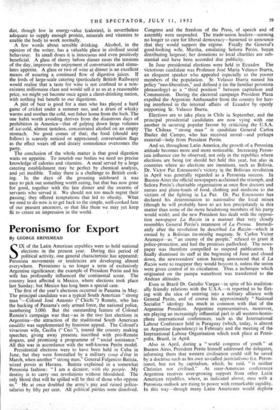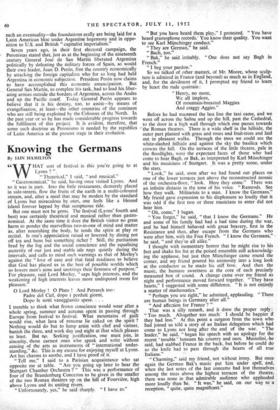Peronismo for Export
By GEORGE BRINSMEAD
SIX of the Latin American republics were to hold national elections in the present year. During this period of political activity, one general characteristic has appeared; Peronista movements or tendencies are developing almost everywhere. Peronismo is no longer a term of exclusively Argentine significance; the example of President Peron and his wife has profoundly influenced the' continental scene. The country least affected is Mexico, where elections took place last Sunday; but Mexico has long been a special case.
The first of the year's elections occurred in Panama in May. The principal candidate was a typical South American " strong man "—Colonel Jose Antonio (" Chichi ") Remon, who has the backing of Panama's only armed force, the national police, numbering 3,000. But the outstanding feature of Colonel Reman's campaign was that—as in the two last elections in Argentina—the attraction of the traditional South American caudillo was supplemented by feminine appeal. The Colonel's vivacious wife, Cecilia (" Ceci "), toured the country making speeches, giving away presents inscribed with pro-Remon slogans, and promising a programme of " social assistance." All this was in accordance with the well-known PerOn model. Presidential elections were to have been held in Cuba in June, but they were forestalled by a. military coup d'etat in March, when another " strong man," General Fulgencio Batista, seized power at Havana. Batista- explained in a somewhat Peronista fashion : " I am a dictator, with the people. My destiny is to carry out revolutions without bloodshed. The only blood that will be spilled will be that of those who oppose us." He, at once doubled the army's pay and ' raised police- salaries by fifty per cent. All political parties were dissolved. Congress and the freedom of the Press, of speech and of assembly were suspended. The trade-union leaders—seeming no longer to care for liberal democracy—hastened to announce that they would support the regime. Finally the General's good-looking wife, Martha, emulating Senora Peron, began distributing largesse; her donations to local charities are sub- stantial and have been accorded due publicity.
In June presidential elections were held in Ecuador. The victorious candidate was Professor Jose Maria Velasco Ibarra, an eloquent speaker who appealed especially to the poorer members of the population. Sr. Velasco Ibarra named his policy "neo-liberalism," and defined it (in the familiar peronista phraseology) as a " third position " between capitalism and Communism. During the electoral campaign President Plaza expelled the Argentine Ambassador from the country for hav- ing interfered in the internal affairs of Ecuador by openly supporting Sr. Velasco Ibarra.
Elections are to take place in Chile in September, and the principal presidential candidates are now vying with one another in securing popular favour by criticising the U.S.A. The Chilean " strong man " is candidate General Carlos Ibanez del Campo, who has received moral—and perhaps material—help from President Peron.
And so, throughout Latin America, the growth of a Peronista attitude becomes more and more noticeable. Increasing Peron- ista influence can be observed, not only in the republics where elections are being (or should be) held this year, but also in countries where no elections are imminent, such as Bolivia.
Dr. Victor Paz Estenssoro's victory the Bolivian revolution in April was generally regarded as a Peronista success. In Buenos Aires the official newspapers acclaimed the triumph, and Senora Peron's charitable organisation at once flew doctors and nurses and plane-loads of food, clothing and medicine to the victims of the fighting in La Paz. Dr. Paz Estenssoro has declared his determinatidn to nationalise the local mines (though he will probably have to act less precipitately in this matter than some of the more headstrong members of his party would wish); and the new President has dealt with the opposi- tion newspaper La Razor! M a manner that very closely resembles General Peron's treatment of La Prensa. Immedi- ately after the revolution he described La Razon—which is owned by a Bolivian tin-minihg magnate, Sr. Carlos Victor Aramayo—as " an enemy of the people," refused to grant it police-protection, and had the premises padlocked. The news- paper was therefore compelled to suspend publication. It finally dismissed its staff at the beginning of June and closed down, the newsvendors' union having announced that if La Razon were to reappear they would boycott it, unless the union were given control of its circulation. Thus a technique which originated on the pampa waterfront was transferred to the Andean altitudes.
Even in Brazil Dr. Getulio Vargas—in spite of his tradition- ally friendly relations with the U.S.A.—is reported to be flirt- ing with the idea of entering into a military alliance with General Per6n, and of course his approximately " National Socialist " ideology has much in 'common with that of the Argentine President. Argentine representatives, moreover, are playing an increasingly influential pait in all western-hemis- phere international conferences, such as the International Labour Conference held in Paraguay (which, today, is almost an Argentine dependency) in February and the meeting of the International Labour Organisation which took ?lace at Petro-. polis, Brazil, in April.
Also in April, during a " world congress of youth " at Buenos Aires, President Per6n himself addressed the delegates, informing them that western civilisation could still be saved by a doctrine such as his own so-called justicialismo (i.e. Peron- ismo), but not by capitalism, which, he said, " is neither Christian nor civilised." At inter-American conferences Argentina receives ever-growing support from other Latin American republics, where, as indicated above, men with a Peronista outlook are rising to power with remarkable rapidity. In this way—though many Latin Americans would deplore such an eventuality—the foundations really are being laid for a Latin American bloc under Argentine hegemony and in oppo- sition to U.S. and British " capitalist imperialism."
Seven years ago, in their first electoral campaign, the • Peronistas stated that, just as at the beginning of the nineteenth century General Jos6 de San Martin liberated Argentina politically by defeating the military forces of Spain, so would their own leader, Juan D. Peron, free the country economically by attacking the foreign capitalists who for so long had held Argentina in economic subjection. President Peron now claims to have accomplished this economic emancipation. But General San Martin, to complete his task, had to lead his liber- ating armies outside the borders of Argentina, across the Andes and up the Pacific coast Today General Per6n appears to believe that it is his destiny, too, to assist—by means of evangelisation, at least—the other countries of the continent who are still being exploited by the Colossus of the North. In the past year or so he has made considerable progress towards the fulfilment of this project. It is evident, therefore, that some such doctrine as Peronismo is needed by the republics of Latin America at the present stage in their evolution.








































 Previous page
Previous page